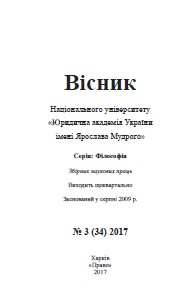ОНТОЛОГИЧЕСКАЯ ВАЛЕНТНОСТЬ ФИЛОСОФИИ ПРАВА
ONTOLOGICAL VALENCE OF PHILOSOPHY OF LAW
Author(s): E. V. KachurovSubject(s): Ancient Philosphy, Early Modern Philosophy, 19th Century Philosophy, Contemporary Philosophy, Philosophy of Law, Hermeneutics, Ontology
Published by: Національний юридичний університет імені Ярослава Мудрого
Keywords: law; theory; philosophy; contemplation; attack; valence;
Summary/Abstract: The competition in modern jurisprudence of two respectable scientific disciplines: the philosophy of law and the theory of law, has so far reached such a poignancy that the relevance of the problem of demarcation of these concepts is beyond any doubt. Parallel with this, the question arises about their being-on importance (ontological status) in relation to the legal reality, of which they are a reflection. Mr. Gadamer the first suggested using the term «valence» (Truth and method, 1959) to express this relationship. The paper considers the main approaches to solving this problem, among them three main ones are distinguished: quantitative, reflexive and phenomenological (existential). Each of these approaches has corresponding origins in the history of the classical philosophical tradition. The greatest attention is paid to the third position, because in it, beginning with Dostoevsky, Husserl and Heidegger, a sharp turn (break), which occurred in European thought in the middle of the 19th century, is clearly recorded. Moreover, this approach allows us to go further than the popular ideologies of the last two centuries (Tseshkovsky, Marx, de Gobineau, etc.), which directly present a different view of the world. Existentialism reveals the essence of any ideology on the one hand, and strive to distance it from the other, on the other. This is a rarity in the modern world. This study argues that the «attack on the existing order of things» (Dostoevsky), «the abandonment of the ancient» Epoch "(Husserl) or» invasion of reality "(Heidegger), is the unified basis of all three dominant ideologies of the twentieth century: liberalism, Nationalism and communism, the direct heir of which is most of the theories of the law of modern jurisprudence. Similar to the theories of law, the author contrasts cognition, which first manifested itself in the «State» of Plato, «Politics» and «Ethics» of Aristotle, and reached a classical pattern in Kant’s Metaphysics of Manners, as well as Hegel’s Philosophy of Law. The paper proves that the basis for this experience is a completely different view of the same reality, which is occupied by modern theory of law. For this, the author again refers to the concept of contemplation, thoroughly thought out in German classical philosophy, and uses the hermeneutics of the three forms of image: reflection, reflection and image, proposed by G.-H. Gadamer in «Truth and Method», for the rehabilitation of the philosophy of law.
Journal: Вісник НЮУ імені Ярослава Мудрого. Серія: Філософія, філософія права, політологія, соціологія
- Issue Year: 34/2017
- Issue No: 3
- Page Range: 123-141
- Page Count: 19
- Language: Russian

